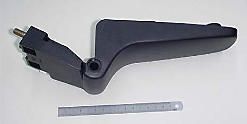Innovative Ideas for Metal Replacement
Article
Making Metal Replacement a Competitive Advantage
Manufacturing and new-product development are both faster-paced and more complex than ever, with metal replacement often a key to reducing weight, cost and production times.
DuPont has a range of high-performance resins for ultra-high strength, temperature resistance and cost-efficient production, in industries ranging from automaking to energy production.
A Growing Opportunity
Currently, approximately 16% of weight in a vehicle is plastic, with a growing trend to possibly reach 25% within the next five years. This increase in light weighting will require engineering plastics for demanding components exposed to stress, vibration, heat and aggressive media.
DuPont sees opportunities for metal replacement in a range of uses such as manufacturing equipment to automotive engines; oil and gas exploration and extraction rigs to mobile phones and tablets.
Multiple Innovation Strategies
An opportunity this big can’t be met with one product, or one approach. That’s why DuPont has material science resources in 40 manufacturing, development and research centers spread across four continents, offering dozens of high-quality thermoplastic and elastomer products, and thousands of grades.
But not only this. In addition, DuPont Performance Polymers has proactively put in place science and collaboration systems that assist the many value chains it serves to be successful in reducing dependence on fossil fuels. We’re committed to discovering and developing lighter-weight alternatives to metal.
Automotive Innovation Centers
Through a global network of Automotive Innovation Centers, DuPont is providing a global collaboration space for customers, government, academia and business partners with access to the DuPont scientific community and real-time, science-powered innovation.
From Pune, India to Troy Michigan; Geneva, Switzerland to Shanghai, China, Innovation Centers allow DuPont to collaborate with clients on practical, day-to-day metal replacement projects and larger goals. Focus areas include developing new products, components and systems, to help reduce dependence on fossil fuels.
Next-Generation Materials
Engineering thermoplastic materials provide consistent strength and stiffness, and outstanding impact performance for metal replacement. They also offer excellent creep resistance, can maintain structural performance at high temperatures and resist corrosion, qualities metal can’t always match.
Zytel® HTN
DuPont™ Zytel® HTN is one example, a high-performance polyamide resin which is a partially aromatic nylon. Most Zytel® HTN resins are polymers known as PPA (polyphthalamide), offering the combination of highest performance and processibility.
Zytel® HTN grades are next-generation products, delivering an excellent balance of strength, stiffness and impact performance, compared to not just metal, but to other glass-fiber reinforced polyamides, as well.
Compared to PAMXD6, a Polyarylamide, Zytel® HTN53 offers:
Superior impact and elongation-to-break values.
- Lower density.
- Lower mold tool temperature, 90°C versus 140°+C.
- Less flash.
- Faster set-up.
Proven Outperformance
Engineering thermoplastic polymers are lighter and stronger than aluminum, magnesium alloy, aluminum alloy and other metals, so they offer great potential to replace traditional metal parts.

Brake Booster
Their performance, coupled with thinner profiles, reduces total cost and weight of parts. In automotive applications, lighter weight helps translate into greater fuel efficiency. Proven performance polymers can contribute to other product and process advantages, too, including:
- Functional benefits through part integration.
- Design innovation possibilities.
- Higher corrosion resistance.Better surface finish, with integral colors.
- Easier handling and lower shipping costs

Tractor Hinge
Another advantage of engineering thermoplastics for metal replacement is their shorter processing cycle. Where die-casting and sheet metal construction is typically a six-step process, thermoplastics go from granules to the finished part in just three steps, which can help users get their completed product in the market sooner.
